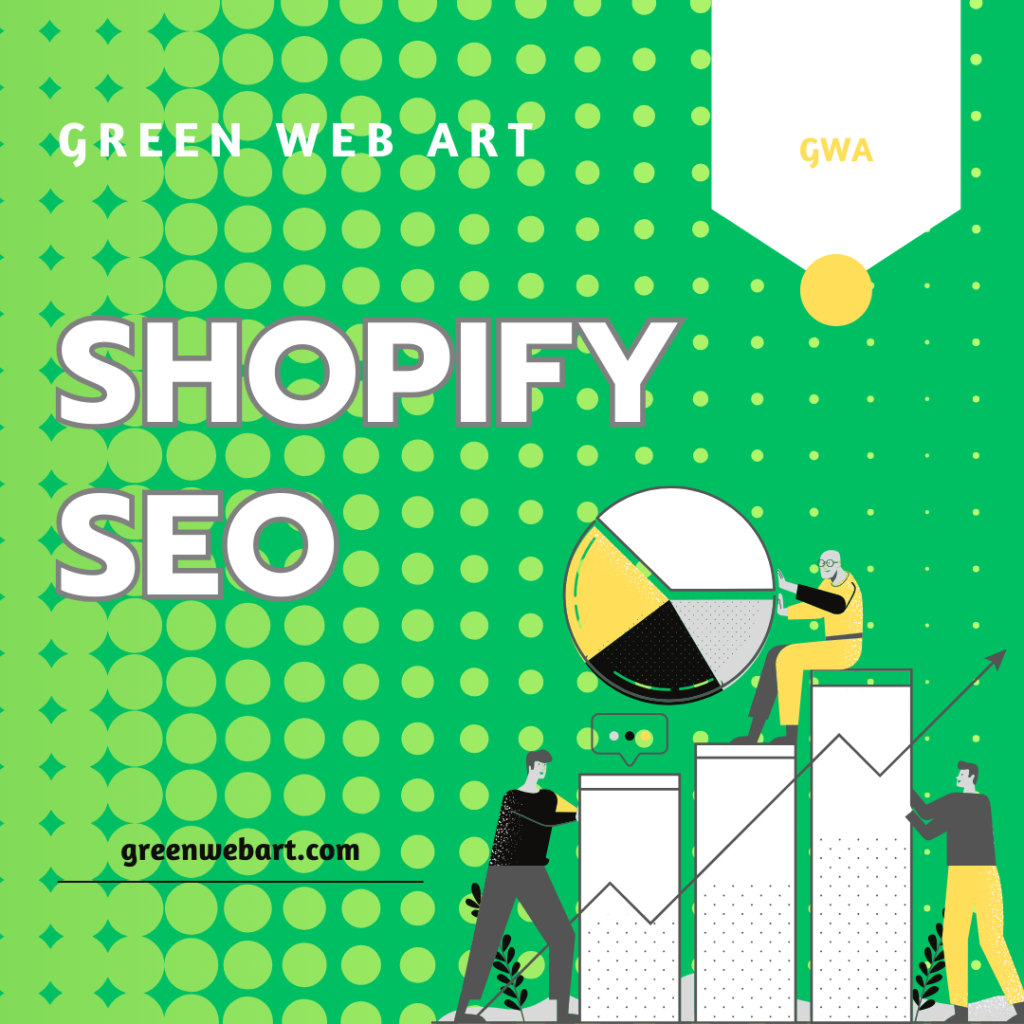-
Mar, Tue, 2024
Shopify SEO
Shopify SEO Services & Search Marketing Experts
For 10 years at Green Web Art, we’ve been SEO experts focusing on Shopify SEO services that drive higher rankings, traffic and sales. Our dedication to eCommerce search engine optimization allows us to use proven techniques and SEO strategies that move the needle for your Shopify store. We look forward to discussing your marketing goals!

With a full in-house team of SEOs, designers and developers, we're industry leading Shopify SEO experts for a reason.
Need game-changing SEO results for your Shopify website? With 10 years of experience, we’ve managed hundreds of eCommerce SEO campaigns, growing online sales month-over-month.
Shopify Tailored SEO Plans
Green Web Art has proven SEO strategies that optimize Shopify websites. We know what’s worked for other clients and we’ll do the same for you.
We Know Shopify Inside & Out
For over 10 years we’ve worked with Shopify, so you’ll be in great hands working with our expert SEO team.
Is a Shopify SEO Campaign for You?
Determining what type of SEO campaign you need can be difficult. We’ll answer any questions, just contact us.
Get Your Shopify SEO Estimate
At Green Web Art we help Shopify websites rank on the 1st page of Google and reach their potential online. We’ll show you exactly what we’ll do, how much it’ll cost, and how we’re going to crush your competitors.
Need an expert now?
What's included in Shopify SEO services?
- Custom Shopify SEO strategy
- Code review and optimization
- Shopify speed optimization
- Content marketing and content creation
- Internal link building
- External link building campaign
- eCommerce keyword research
- Product optimization
- Category Optimization
- URL optimization & updates
- Robust monthly SEO reports
- Google Ads consulting focused on eCommerce sales
- Conversion rate optimization
- & much more

Shopify SEO Tips for Ranking Your Store at The Top of Google
Using Shopify SEO strategies to rank your store at the top of organic search is one of the best ways to grow your online sales. But, the reality is, whether performing SEO in-house or choosing a Shopify SEO services provider to handle the campaign for you, landing top positions is no easy task. Below we’ll outline some of our top tips for creating a success eCommerce search engine optimization campaign.
Optimize Website Speed:
Google PageSpeed is crucial for SEO for several reasons:
1. User Experience: Google’s primary aim is to provide users with the best possible search results, which includes sites that load quickly and provide a good user experience.
2. Ranking Factor: In 2018, Google announced that page speed would be a ranking factor for mobile searches. Therefore, a slow-loading site could negatively impact your site’s SEO.
3. Engagement Metrics: Slow sites tend to have higher bounce rates and lower average time on page. These are metrics Google uses to understand a site’s quality and relevance to users.
4. Indexing: Google has a crawl budget – the number of pages it will crawl on your site within a certain timeframe. If your pages are slow to load, Google may crawl fewer pages, affecting how they’re indexed.5. Mobile First Indexing: With Google’s shift to mobile-first indexing, site speed on mobile devices is more important than ever. If your site is slow on mobile, it could harm your visibility in search rankings.
By optimizing your Shopify site for speed, you’re not just improving the user experience, but you’re also working to improve your site’s visibility and ranking in search results.
To optimize the speed of a Shopify website, you can follow these steps:
1. Reduce Image Sizes: High-resolution images can cause slow page load times. Use compression tools like TinyPNG or Shopify’s image compression features to optimize images without losing quality.
2. Minimize Apps and Themes: Uninstall any unnecessary Shopify apps and themes, as they can also contribute to slow loading times.
3. Use a Fast and Mobile-Friendly Theme: Choose a theme that is well-optimized for speed and is also mobile-friendly.
4. Minimize Redirects: Each redirect triggers an additional HTTP request-response cycle, which delays page rendering.
5. Limit the Use of Render-Blocking Javascript: Render-blocking JavaScript prevents above-the-fold content on your page from being rendered until the JavaScript has finished loading. This can slow down your site, especially for mobile users.
6. Use a Content Delivery Network (CDN): Shopify automatically uses a CDN, which stores copies of your site at various points around the world to serve content more quickly to users in different locations.
7. Optimize CSS Delivery: Minimize CSS files and eliminate unnecessary code. CSS should be at the top of your HTML document to prevent the page from being displayed as unstyled content while the CSS loads.
8. Optimize Liquid Code: Liquid is the template language used by Shopify. It’s a good practice to regularly check and clean the code for efficiency.
9. Leverage Browser Caching: Shopify automatically does this for all files served from Shopify’s CDN, but be sure that any files served from other locations are cached as well.
Turn Categories In Landing Pages:
Google loves to deliver great content to a website visitor and serve up that content high in their rankings. We all know content is a major ranking factor, but often we leave category pages bare with nothing more than product listings. Consider turning your category pages into landing pages by building out content at the top and bottom of the page. This content can include information about the products you sell, FAQs about the product category or product line and can give you a place to link to articles and buying guides you’ve created that are targeted around the same topic as the category.
Create Sub-Category Pages:
Product filtering is very commonly used on a Shopify store, but can actually have detrimental affects on SEO. For example, if you sell sofas online and have a main category page for sofas and filters for colors, you don’t really have a landing page for “grey sofas”, which is searched almost 4,000 times per month. Consider how you can create niche sub-category pages that will have the ability to rank for less competitive terms that will convert at a higher rate.
Build Supporting Content & Your EEAT Score:
Google’s EEAT score, which was formally EAT, stands for Experience, Expertise, Authoritativeness, and Trust. Google reviews your content and uses these factors to determine where you should rank when a term is searched. One of the best ways to increase your EEAT score is to build authoritative content around your main topics. For example, if you sell running shoes, creative informational guides about the different types of running shoes available, which ones to choose based on needs, and other valuable information will help to boost your authority. Remember, while you built your website to sell products, it must also inform visitors and help them to make the best purchasing decisions possible.
Create a Strong Internal Linking Structure:
Interlinking your pages is a way to show Google what a page should rank for. Link from main category pages to sub-categories and from products to related products. Not only does this show Google that these pages exists, helping them to be indexed, but the keywords within the anchor text will boost those pages rankings. Also, review your articles and blogs seeing where there are opportunities to link back to categories and products and try to use keywords within those links. A strong internal linking campaign can boost traffic on a Shopify store in a major positive way.
Get Pages Indexed:
If you have a large Shopify store, sometimes getting all of your products or even categories indexed can be challenging. Typing this comes do to two main reasons:
- 1) Google doesn’t know the pages exist – Be sure you’re linking to all of your pages within your site. If you’re not linking to them, it can be tough for Google to know they exist. Also, double check your not blocking pages in your robots.txt file and your pages are included in your sitemap.xml file.
- 2) The pages don’t have value – If Google knows your page exists but it has little content, Google may determine it does not want to index the page. This often happens with products that may be similar to other products or product pages that do not have unique product descriptions. Be sure they page is valuable and offers content that a user would want to read.
Build Your Brand Name:
Outside of managing your website there are other ways to build your brand which can affect SEO. How many websites link to yours is a major ranking factor and if you build your brand name often other websites will link to yours. They may link to your website because of press you receive, an interview that you do, or because a piece of content you put on social media goes viral. Either way, getting your brand name out to the world is make a positive impact on the way Google looks at your website.
Shopify SEO FAQS?
Shopify SEO services are search engine optimization services focused on improving keyword positions in Google and other search engines for Shopify websites. These services typically include technical optimizations, on-page modifications, content creation, category and product page optimizations and more. The objective is to increase organic website traffic which leads to an increase in Shopify store sales.
The cost of SEO depends on what keywords you’re looking to rank for and how well you currently rank. Since Shopify is an eCommerce online store platform, most clients on Shopify are looking to rank nationally or internationally and sell their products globally. SEO pricing and plans can range anywhere from $1,000 to $10,000+ a month depending on the level of SEO effort. When you’re at the top of the search results in Google or other search engines, your Shopify sales will grow exponentially. If you want to get started on a campaign, we can provide a free SEO audit and proposal. We also offer SEO consulting services if you’re looking for a game plan for your in-house team to implement.
SEO for Shopify consists of making your website better. Better for users and better for the Google robots. What is better? Better category and product pages that are easily understood, coded correctly, have the proper SEO elements in the right places – creating authoritative pages.
At Green Web Art we have proven methods for eCommerce SEO and will apply these to your Shopify website, making it not only rank higher but convert better, too.
The first thing to look for is how well the SEO company ranks itself. If you search “Shopify SEO company” or “Shopify SEO services,” where do they show up? Also, make sure any SEO agency you work with is located in the USA and does not outsource their work. Poor SEO services can lead to major website problems and it’s important to work with an agency that understands how valuable your website and search rankings are. At Green Web Art, we’re rated one of the best SEO companies each year and have been in business, delivering top search rankings, since 2014. Shopify also has a directory of Shopify SEO Experts.
When you begin an SEO campaign on your Shopify website having clear and realistic expectations is a must. If you have a website that has been around, has some domain authority, and already has decent search rankings (meaning some keywords on page one, many on pages two and three of Google) you can expect results from optimization within 30-90 days. If you have a newer website or even a brand new Shopify website, it can take up to a year to really gain traction. Our experts can review your website and where you currently stand to provide proper expectations.
Shopify has some quirks when it comes to SEO. One of the most famous issues comes with technical SEO and on-page SEO, such as URL structure in that every category page falls under /collections/. While this isn’t ideal for SEO purposes, it also isn’t a total deal-breaker unless you just can’t stand having “collections” in all of your URLs. Shopify filters also create duplicate content issues, but those issues are easily handled by an SEO familiar with Shopify. We wrote a great article titled Shopify SEO Issues & Common Problems that goes more in-depth on issues and also how to fix them.
When determining if SEO is working the best way to look at it is using a three-step process. 1) Have the keywords I most care about increased in rankings. Are they more visible to someone looking for my products than they were before I started my SEO campaign? 2) Am I getting more traffic to my website. Utilizing a tool such as Google Analytics makes this easy to evaluate. 3) Have my online sales gone up? Also, more specifically, have they gone up via the organic channel. In Google Analytics you can easily filter eCommerce sales by channel and see all sales that came directly from organic search.
Building your keyword list is a collaborative process in which we do keyword research and you provide keywords you feel are most valuable. When starting a campaign you know more about your business than any agency does, so it’s important to give your input. If you don’t speak up, a keyword important to you may miss your final keyword list. In the end, the keyword list should contain all of the important keywords and also how many times each keyword or phrase is searched per month. The search volume will help to determine which keyword may be most valuable to your business if you were to rank page #1 or overall #1 for that keyword or phrase.
SEO on an eCommerce website is very different. Dealing with hundreds of categories and products demands unique strategies and expertise in dynamic optimization – tasks SEO companies inexperienced in eCommerce SEO fall short on. When hiring an SEO company to handle your Shopify store be sure to get references and examples of other Shopify websites and eCommerce businesses. If an agency is highly experienced in eCommerce they’ll be able to leverage their past knowledge to make your campaign more successful in a shorter amount of time. Be sure the company has a primary SEO focus and that they are not mainly a PR agency or social media expert.
Another big part of SEO is dealing with search engine algorithm changes as they roll out. An experienced eCommerce agency will be well equipped to deal with the changes and continue to drive up sales revenue through high-ranking search terms.
Creating new blog content and articles is an important part of an ongoing SEO campaign. Creating content and performing page optimizations will allow you to target new keywords that you may currently not have pages to target. Whenever creating new article content, we’ll consider search intent and the conversion rate of the traffic. Our goal is to drive traffic that turns into sales, not just general website traffic.
Let’s talk about your project
Need game-changing SEO results for your Shopify website? With 10 years of experience, we’ve managed hundreds of eCommerce SEO campaigns, growing online sales month-over-month.

